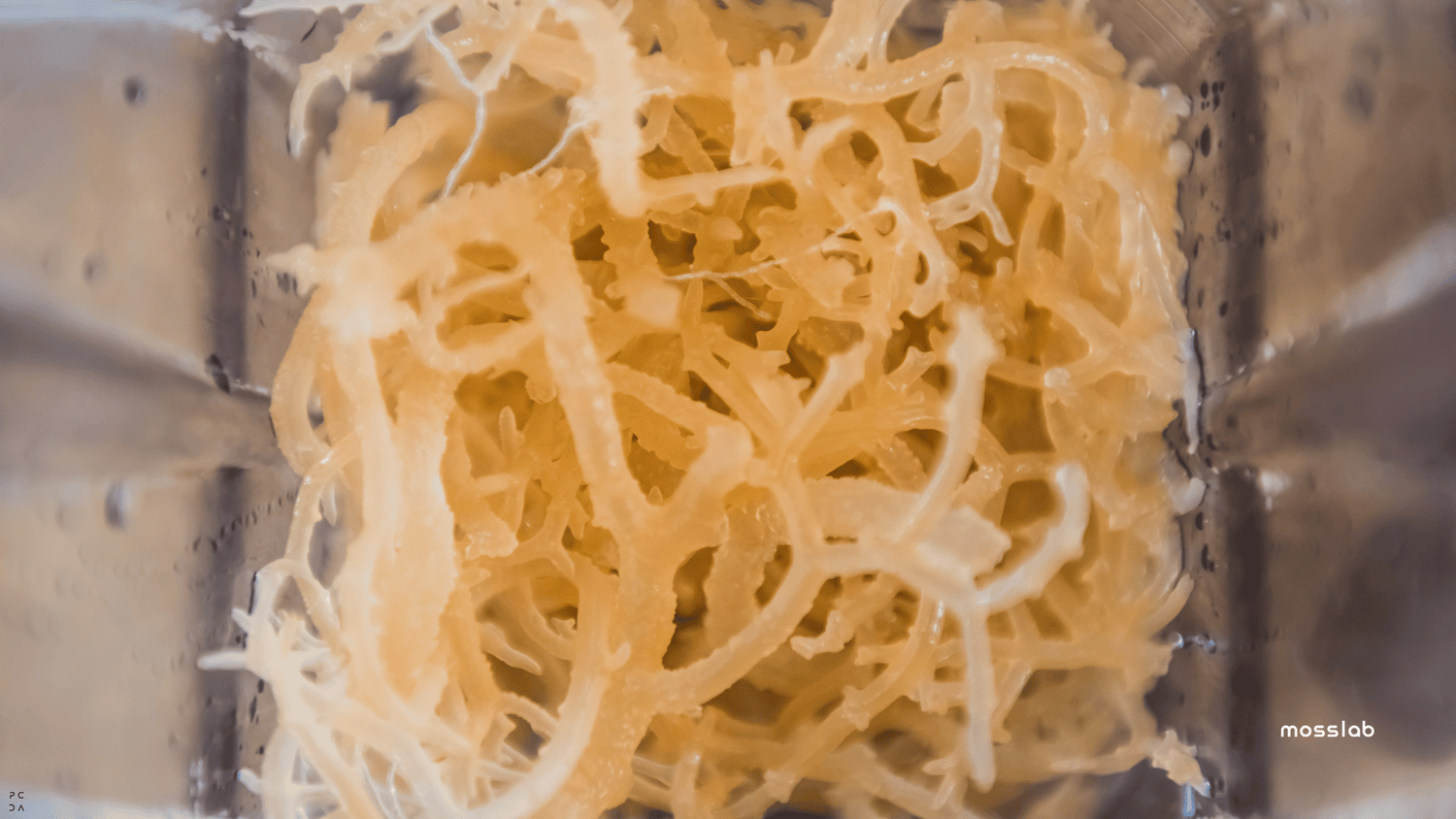Sea moss is not actually a moss, despite its name. It is a type of red algae or seaweed that grows in marine environments. Have you ever wondered why sea moss is gaining so much attention in wellness circles? It's not just a passing trend; its benefits speak for themselves. Rich in iodine and essential nutrients, sea moss supports thyroid function and metabolism. But that's just the tip of the iceberg. Its role as a prebiotic can greatly enhance your gut health, while its fiber content might be the ally you need for weight management. Curious about how it affects your mood or boosts your immune system? There's more to explore about this oceanic powerhouse.
Health Benefits

Among the many natural remedies gaining popularity, sea moss stands out for its impressive health benefits. If you're looking to support your thyroid, sea moss could be a game-changer. Its high iodine content is essential for healthy thyroid function, which plays a significant role in hormone regulation and metabolism. A well-functioning thyroid can help keep your energy levels steady and support overall wellness.
But that's not all sea moss offers. With its prebiotic effects, it promotes gut health by encouraging the growth of beneficial bacteria. This can enhance digestion and improve nutrient absorption, making you feel better from the inside out. A healthy gut is often linked to better mood and immune function, so incorporating sea moss into your diet might give you that extra boost you need.
For those concerned with weight management, sea moss is worth considering. Its high fiber content promotes a feeling of fullness, helping you manage your appetite and reduce overeating. By incorporating sea moss into your routine, you're not only supporting your thyroid and gut health but also taking a step toward maintaining a healthy weight. It's a versatile addition to your wellness toolkit.
Nutritional Profile

Diving into the nutritional profile of sea moss, you'll find it packed with essential nutrients that are fundamental for maintaining good health. Sea moss contains approximately 15 of the 18 essential nutrients your body needs, including iodine, calcium, magnesium, and zinc. This impressive array of nutrients supports various bodily functions, ensuring you get a thorough boost to your overall well-being.
One of the standout features of sea moss is its high iodine content. Iodine plays a significant role in supporting thyroid function, which is necessary for hormone regulation and metabolism. By incorporating sea moss into your diet, you're potentially aiding your thyroid's health, which can have a ripple effect on your energy levels and overall health.
In addition to iodine, sea moss is also a fantastic source of vitamins A, C, E, and K. These vitamins are key to immune system support, skin health, and even vision. Furthermore, sea moss is high in fiber, promoting digestive health and maintaining a balanced gut microbiome. Low in calories, it's an excellent option if you're aiming to manage your weight without sacrificing essential nutrients. Embracing sea moss in your diet could be a simple yet effective way to enhance your nutritional intake.
Potential Side Effects

When incorporating sea moss into your diet, it's important to be aware of its potential side effects. One vital concern is its high iodine content, which, if consumed excessively, might lead to thyroid complications like inflammation or dysfunction. Additionally, sea moss can absorb heavy metals such as arsenic, mercury, and lead from polluted waters, possibly posing health risks if not sourced carefully. For those on anticoagulant medications, sea moss's blood-thinning properties could heighten the risk of bleeding, so caution is advised.
| Potential Risk | Description |
|---|---|
| Excessive Iodine | May cause thyroid issues. |
| Heavy Metals | Absorption of arsenic, mercury, lead. |
| Blood Thinner Interaction | Increases bleeding risk with certain meds. |
| Allergic Reactions | Possible in those sensitive to sulfur/shellfish. |
| Texture and Taste | Slimy and fishy, possibly unappealing. |
Allergic reactions are another potential side effect, especially for those with sensitivities to sulfur or shellfish. Monitoring for any signs of reaction is essential. Also, the slimy texture and distinct fishy taste of sea moss might not be to everyone's liking, possibly leading to reduced consumption. Always verify you source your sea moss carefully and consider consulting a healthcare provider before adding it to your diet.
Usage Guidelines
Sea moss is frequently consumed in various forms like gels, powders, capsules, and gummies, making it adaptable for incorporation into different dietary routines. When considering sea moss supplements, it's important to follow specific usage guidelines to guarantee maximum benefits and safety. Typically, the recommended serving size is 2 tablespoons. This moderation helps prevent excessive iodine intake, which is particularly significant for maintaining thyroid health.
If you opt for raw sea moss, proper preparation is key. Start by washing and soaking the sea moss in cold water for 24 hours until it expands and becomes jelly-like. Afterward, blend it with water to create a gel that can be easily added to your meals or smoothies.
Before adding sea moss to your diet, it's wise to consult a health care provider, especially if you have pre-existing health conditions or are on medication. This step guarantees that sea moss won't interfere with your health or any treatments you may be undergoing.
Additionally, always verify the quality and source of sea moss supplements to avoid contaminants. Since not all products are regulated, being cautious can help guarantee you're consuming safe, effective supplements.
Popular Recipes
Exploring the culinary possibilities of sea moss can be an exciting journey given its versatility and nutritional benefits. Whether you're looking to boost vitamins and minerals or simply enjoy its rich in nutrients profile, sea moss gel can be a game-changer in your kitchen. Want to thicken your smoothie without altering its flavor? Just add sea moss gel and enjoy the health benefits like improved digestion and a vitamin boost. It's also a fantastic thickening agent for soups and stews, enhancing consistency while infusing your dish with fiber and antioxidants.
Here's a quick guide to incorporating sea moss into popular recipes:
| Recipe | Benefits |
|---|---|
| Smoothies | Thick texture, boosts vitamins and minerals |
| Soups and Stews | Thickening agent, adds fiber and antioxidants |
| Muffins and Pancakes | Enriches with calcium and iodine |
| Energy Bars/Protein Balls | Adds omega-3s and essential minerals |
For a creative twist, try mixing sea moss powder into your baked goods like muffins and pancakes—this will enrich them with essential nutrients. Or, for a nutrient-packed snack, add sea moss to homemade energy bars. And don't forget, sea moss gel can even make your salad dressings creamy and nutritious while keeping them vegan and gluten-free.




